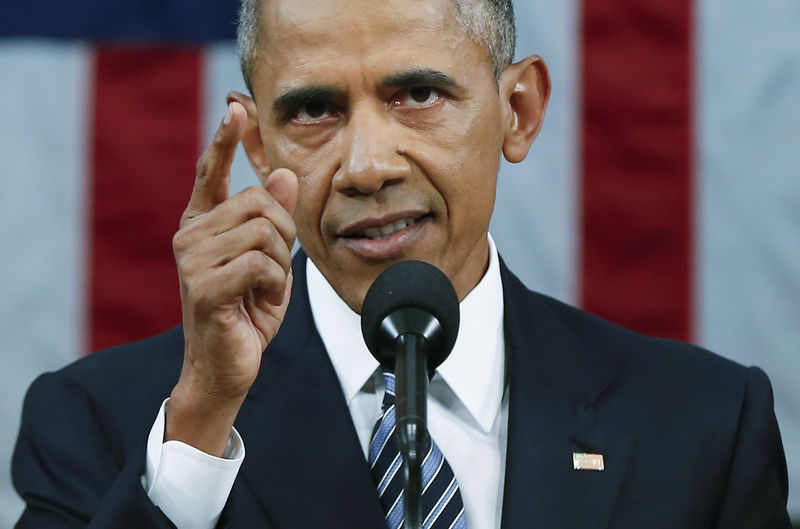By James Oliphant
WASHINGTON (Reuters) - Donald Trump was not in the room during U.S. President Barack Obama's final State of the Union speech, but the Republican presidential front-runner was a looming presence nonetheless.
Both Obama's speech on Tuesday and, for that matter, the Republican response by South Carolina Governor Nikki Haley, took pains to rebuke Trump, the real estate billionaire whose red-hot rhetoric has endeared him to some and dismayed others in the campaign for the Nov. 8 presidential election.
Obama and Haley, although from different parties, offered a defense of establishment politics, a plea for optimism and a quest for common ground.
Obama seemed to refer specifically to Trump's call for a temporary ban on Muslim immigration following a deadly shooting attack last month in San Bernardino, California, by a couple authorities said had been radicalized.
"We need to reject any politics that targets people because of race or religion. This isn't a matter of political correctness," Obama said.
Trump has mounted much of his insurgent candidacy on the notion of America losing ground, both economically and in terms of global influence. Obama rejected that idea outright.
"It's easier to be cynical," Obama said, "to accept that change isn't possible, and politics is hopeless, and to believe that our voices and actions don't matter."
Soon after Obama concluded his remarks in the chamber of the House of Representatives, Trump tweeted: "The State of the Union speech was one of the most boring, rambling and non-substantive I have heard in a long time."
While consistently criticizing Obama's record, Haley, the daughter of Indian immigrants and a potential Republican vice presidential choice, also seemed to indict Trump's message.
"Some people think that you have to be the loudest voice in the room to make a difference," she said. "That is just not true. Often, the best thing we can do is turn down the volume. When the sound is quieter, you can actually hear what someone else is saying. And that can make a world of difference."
Like Obama, Haley did not mention Trump by name during her address but she criticized him in an interview on NBC's "Today show" on Wednesday while calling on the Republican Party to be more inclusive.
"Mr. Trump has definitely contributed to what I think is just irresponsible talk," she said.
Trump responded shortly afterward by telling Fox News that Haley has been "very weak on illegal immigration" for a long time.
Paul Sracic, chairman of the politics department at Youngstown State University in Ohio, said Trump was dominating "our political discourse in a way that no one would have predicted even a year ago."
"Donald Trump must be smiling tonight," he said, pointing out that the candidate managed to make himself the target of not just the State of the Union address, but also the Republican response.
The White House gave Haley credit for defending "American values" in her speech. "She was willing to do something that a lot of other Republicans - leading Republicans - have been unwilling to do," White House spokesman Josh Earnest told reporters on Wednesday.
But he stressed that the administration disagrees with many of Haley's positions.
Obama flew on Wednesday to Nebraska, a Republican "red state," to promote the big-picture ideas he laid out in his speech.
CRUZ WEIGHS IN
On Tuesday night, Obama also appeared to single out conservative Texas Senator Ted Cruz, the top challenger to Trump in the Republican race. Cruz has called for a massive bombing campaign in Iraq and Syria to wipe out Islamic State forces.
Meeting the threat of Islamic State, Obama said, "needs to be more than tough talk or calls to carpet-bomb civilians."
Democratic strategist Brad Bannon said Obama "made the argument very well that leadership is not bombing the crap out of someone."
Cruz quickly countered in a statement. Obama, he said, "lectures us on civility yet he has been one of the most divisive presidents in American history."
Both Trump and Cruz, who are topping opinion polls weeks before the early nomination contests in Iowa and New Hampshire, have pledged to push the Republican Party in a more confrontational direction, and seek to undo much of what Obama has accomplished as president.
Both candidates are likely in coming days to hammer the Obama administration on its approach to Islamic State.
Obama's defense of pragmatic politics may also help his former secretary of state, Hillary Clinton, who is trying to stave off a challenge from self-described democratic socialist Bernie Sanders in the Democratic presidential contest, said Bannon.
"He's taking about holding up the establishment," he said. "When the president makes a good case, it helps Hillary more than Bernie."

But John Geer, an expert on voter opinion at Vanderbilt University, thought Obama, in his bid for unity, damaged Clinton's prospects by not making a stronger case for continuing the Democratic agenda. "He didn't put forward an argument why there should be another Democrat for four years," Geer said. "I think she would have liked to see that."